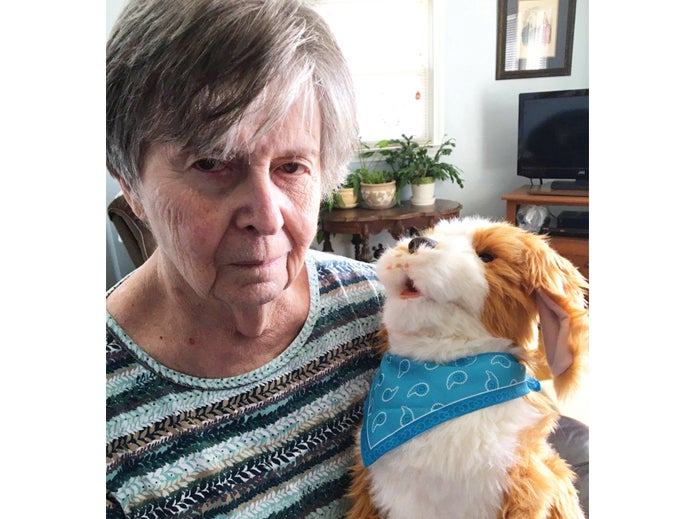Senior Services shares companionship with seniors through automated pets initiative
Published 12:00 am Thursday, February 11, 2021

- Glenda with her animatronic robotic pet
|
Getting your Trinity Audio player ready...
|
WINSTON-SALEM — Senior Services is piloting an animatronic robotic pet initiative designed to help relieve some of the loneliness many older adults are experiencing as a result of the COVID-19 pandemic. The pets, especially helpful for seniors living with memory loss and dementia, are being delivered to 30 older adults enrolled in their Williams Adult Day Center, Home Care, Meals-on-Wheels and Living-at-Home programs. “The coronavirus has been difficult for everyone, but in terms of isolation, it has been devastating for many seniors in our community,” said Melissa Smith, director of innovation and initiatives. While the pets are not a replacement for human connection, she hopes that having a furry friend to pet and interact with will ease the loneliness many Senior Services participants are experiencing.
Pet therapy, with live animals, has been used for many years to emotionally benefit people living with dementia and other forms of memory loss. Robotic pets have recently shown to have similar results. The pets’ realistic feeling fur, sounds and movements have shown to be especially useful and enjoyable to older adults who are no longer physically able to care for live animals. Snuggling or playing with them often seems to foster memories of childhoods spent with favorite pets. There is also evidence that engaging with the automated animals may improve interactions with caregivers.
The pets also have other direct benefits for the participants’ caregivers. “They will help reduce caregiver stress by providing seniors — especially people living with memory loss, an opportunity to engage in the positive feelings associated with caring for a pet. The opportunity to comb its fur, scratch its ears, pet and love on it, which will help to soothe and calm participants and even provide them with some fun, laughs and joy,” said Smith. She’s not alone. “The participants love them!” said Cynthia Becker, assistant program coordinator, who has experience making use of similar pets while working with participants living with dementia who attend Senior Services’ award-winning Williams Adult Day Center. “Ever since COVID-19 hit, our participants have had such little exposure to the outside world. Most of them don’t have pets, so this will be like a constant companion to bring them joy and solace,” she said.
The initiative was made possible through grants received as part of Senior Services special technology initiatives aimed at reducing isolation and increasing connection and engagement during the pandemic. The organization is always interested in learning how its initiatives impact the people it serves. Smith will survey the recipients’ care partners at regular intervals to see what the effects of the pets have been, both on caregiver stress and for the participant themselves. Smith says, “When initiatives such as this are successful, we attempt to expand them, share our models with others, and continue new and innovative options for caregivers and participants. We’re committed to doing all that we can to make life better for older adults as we make our way through this pandemic and beyond.”



